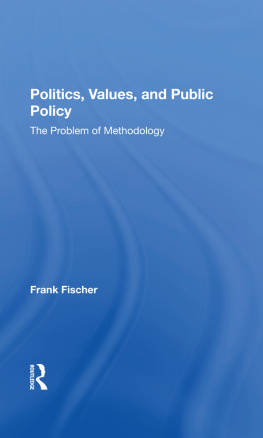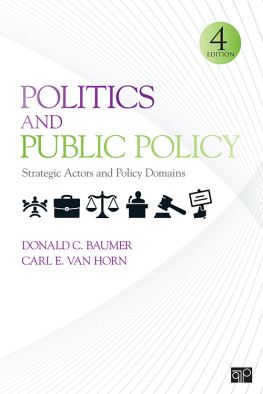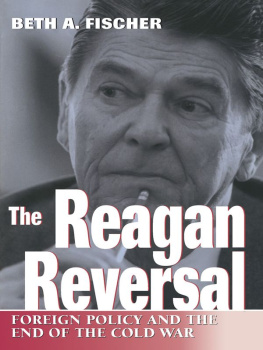Politics, Values, and Public Policy
Other Titles of Interest
Rhetoric and Reality: Presidential Commissions and the Making of Public Policy , Terrence R. Tutchings
National Planning in the United States: An Annotated Bibliography , David E. Wilson
The National Planning Idea in U.S. Public Policy: Five Alternative Approaches , David E. Wilson
Valuing Life: Public Policy Dilemmas , edited by Steven E. Rhoads
Science, Politics, and Controversy: Civilian Nuclear Power in the United States, 19461974 , Steven L. Del Sesto
Judgment and Decision in Public Policy Formation , edited by Kenneth R. Hammond
A Westview Special Study
Politics, Values, and Public Policy: The Problem of Methodology
Frank Fischer
Addressed to the growing concerns about norms and values in policy assessment, this study develops a methodology for the political evaluation of public policy. It is designed to move policy evaluation beyond its current emphasis on efficient achievement of goals, focusing instead on the assessment of the acceptability of the goals themselves, employed as normative criteria. Dr. Fischer raises fundamental problems associated with the traditional fact-value dichotomy; he points to the methodological integration of empirical and normative data as a major barrier to a relevant social science contributing to policy questions. Although he does not purport to resolve the disputes long surrounding the fact-value separation, he does offer an alternative avenue for bypassing the epistemological impasse. To demonstrate the effectiveness of his methodology, he applies it to an urban decentralization argument.
Frank Fischer is assistant professor of political science and administrative studies at Rutgers University in Newark. He has also taught at New York University and the State University of New York and has gained a wide range of practical experience as a public policy analyst.
First published 1980 by Westview Press
Published 2019 by Routledge
52 Vanderbilt Avenue, New York, NY 10017
2 Park Square, Milton Park, Abingdon, Oxon OX14 4RN
Routledge is an imprint of the Taylor & Francis Group, an informa business
Copyright 1980 Taylor & Francis
All rights reserved. No part of this book may be reprinted or reproduced or utilised in any form or by any electronic, mechanical, or other means, now known or hereafter invented, including photocopying and recording, or in any information storage or retrieval system, without permission in writing from the publishers.
Notice:
Product or corporate names may be trademarks or registered trademarks, and are used only for identification and explanation without intent to infringe.
Library of Congress Cataloging in Publication Data
Fischer, Frank, 1942-
Politics, values, and public policy.
(A Westview special study)
Bibliography: p.
1. Policy sciences-Methodology. I. Title.
H61.F54361.6101880-16248
ISBN 13: 978-0-367-28380-3 (hbk)
This book is addressed to the growing concern about the role of values in public policy evaluation. In the political and social sciences, few subjects have been discussed more extensively than the question of the relation of facts to values in social investigation. Even though the prolonged debate about facts and values remains inconclusive, mainstream social scientists continue to adhere to a methodological separation of facts and values and to the principle of value neutrality. Inherited from positivism, this position asserts that values rest fundamentally on personal preference or conviction and, therefore, are beyond the reach of rational scientific assessment. For the policy sciences, these assumptions have established the epistemological groundwork for an empirical orientation that emphasizes technical analyses of the efficiency of program goals. The choice of which goals and values to pursue is understood to be beyond rational assessment.
However, in recent years both political theorists and policy analysts have increasingly questioned the wisdom of adhering to these behavioral science principles. Although the evaluation of public policy has developed into a small industry, early enthusiasm about the use of evaluation findings has in many quarters turned to skepticism. As one analyst summed it up, everyone supports policy evaluation in principle, but few have much hope that its conclusions will be utilized in real-world policymaking. The limitations of a policy science dominated by the criteria of efficiency emerge dramatically when confronted by our domestic social crises. Significantly, a growing number of writers attribute the political failures that policy evaluation has encountered to its narrow instrumental focus. Most of our social crises involve more than matters of inefficient programs: first and foremost, they involve basic value conflicts. In this respect, we have developed a policy science aimed at the relatively less important aspects of our social problems and have in turn developed no method for assessing the more fundamental questions that underlie them.
Such questions have renewed methodological exploration in the political and policy sciences. Some policy writers have begun to recognize the necessity of studying the normative political dimensions of policy evaluation and decision making. Beyond the emphasis on efficiency, these theorists understand the need to include the political assessment of policy goals. For them, a major barrier to a social science that can contribute to policy questions is the methodological integration of empirical and normative analyses. This requires the development of a political methodology addressed to the analytical tasks of policy evaluation.
In this study, I have attempted to offer a practical solution to this methodological problem. Although the study does not purport to resolve the metaethical disputes long surrounding the fact-value dichotomy, it does suggest an alternative approach for bypassing basic epistemological problems at the level of practical deliberation. Political theorists have for some time discussed the construction of a critical evaluation method, but few have said much about what it might look like in public policy evaluation. I have attempted to open a preliminary discussion in this direction.
My alternative is constructed around insights drawn from Jrgen Habermass communications model of practical discourse, Stephen Toulmins informal logic of normative reason, and Paul Taylors logic of evaluation. Through a synthesis of key aspects of the works of these theorists, I have presented a methodological framework for political evaluation that is designed to serve as the basis for a critical political method. As a suggestive beginning, this framework organizes key questions from both the empirical and normative traditions in the fact-value controversy. Toward this end, the methodologically diverse contributions of evaluation research, phenomenological sociology, the behavioral systems perspective, and political philosophy are integrated as specific phases of a full evaluation. For policy evaluation, the relationships among these perspectives provide the methodological basis for developing a logic of questions designed to facilitate the probe of policy judgments. In this regard, I have sought to translate the epistemological requirements of these relationships into practical guidelines for policy deliberation and to link them to emerging lines of investigation in the policy sciences, especially the forensic or communications model of policy argumentation.












